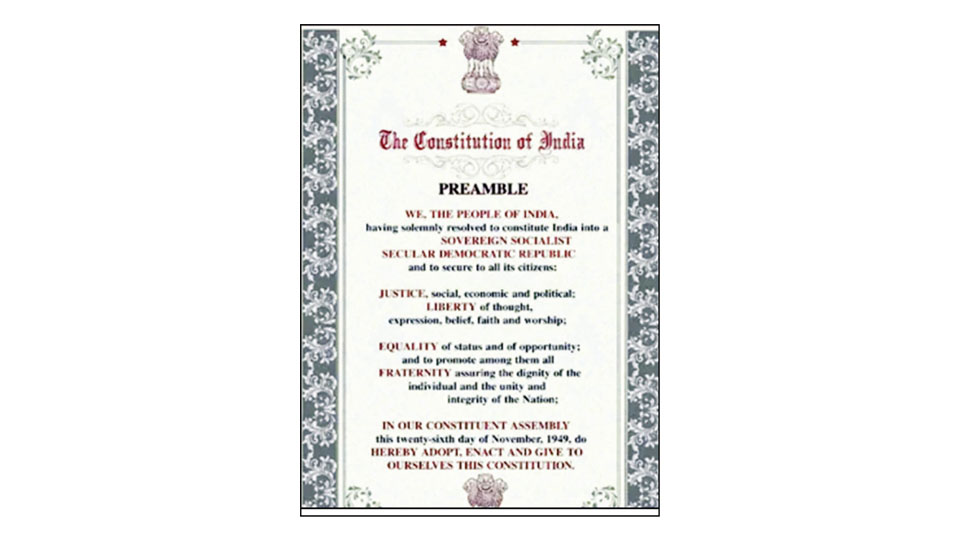


The Supreme Court has rejected three petitions seeking to delete the words 'secular' and 'socialist' from the Preamble of the Constitution of India. The Court stated that the power to amend the Constitution extends to the Preamble and that the words were inserted in 1976 during a national emergency. The Court also clarified that the terms 'secular' and 'socialist' do not restrict economic policies and reflect the State's commitment to equality and welfare. The petitions were filed by former BJP leader Subramanian Swamy, advocate Ashwini Upadhyay, and Balram Singh.
Supreme Court Rejects Challenges to 'Secular' and 'Socialist' in Constitution's Preamble
The Supreme Court of India has dismissed three petitions seeking to delete the words "secular" and "socialist" from the Preamble of the Constitution. This landmark decision protects the foundational principles of the Indian Constitution and reaffirms the nation's commitment to a secular and egalitarian society.
Background
The Preamble to the Indian Constitution was adopted on November 26, 1949. It encapsulates the fundamental principles and aspirations of the Indian people. However, in 1976, during the Emergency declared by Prime Minister Indira Gandhi, the words "secular" and "socialist" were inserted into the Preamble. These amendments were challenged by critics who argued that they violated the basic structure of the Constitution.
Case Proceedings
The recent petitions seeking to remove the disputed terms were filed by former BJP leader Subramanian Swamy, advocate Ashwini Upadhyay, and Balram Singh. They contended that the words "secular" and "socialist" were alien to Indian culture and restricted economic policies.
The Court, however, rejected these arguments. The judges held that the power to amend the Constitution extends to the Preamble and that the disputed terms had been legitimately inserted during a valid national emergency.
Court's Reasoning
The Court emphasized that the terms "secular" and "socialist" do not prohibit free market policies or economic development. Instead, they reflect the State's commitment to equality, welfare, and the separation of religion and state.
The Court clarified that the word "secular" guarantees religious freedom and prohibits discrimination based on religion. It does not mean that India is an atheist state but rather that all religions are equally respected and protected.
Similarly, the Court explained that "socialist" signifies the State's responsibility to ensure social and economic justice for all citizens. It does not imply a specific economic ideology but rather a commitment to a fair and equitable society.
FAQs
Q1: Why were the words "secular" and "socialist" added to the Preamble? A1: They were added during the Emergency in 1976 to reinforce the principles of equality, welfare, and separation of religion and state.
Q2: Does the term "secular" mean that India is an atheist state? A2: No, it means that India is not affiliated with any particular religion and that all religions are treated equally.
Q3: Does "socialist" imply a specific economic ideology? A3: No, it reflects the State's commitment to social and economic justice for all citizens, regardless of their economic status.
Q4: Can the Preamble be amended? A4: Yes, the Preamble is part of the Constitution and can be amended through a special procedure involving a two-thirds majority in Parliament.
Q5: What does the Supreme Court's decision mean for the future of the Indian Constitution? A5: The decision affirms the Court's commitment to preserving the basic structure of the Constitution and the fundamental principles enshrined in the Preamble.

According to sources, the Special Intensive Revision (SIR) exercise in West Bengal has identified a total of 58,80,202 voters who may be excluded from the draft voter list. This includes people who have passed away, transferred, missing, and identified as 'fake' by the Election Commission. These numbers are subject to change in the final list, which is set to be published on February 14, 2022. The commission has divided voters into three categories - own mapping, progeny mapping, and non-mapping - depending on their presence in the 2002 voter list. Those not falling into any of these categories will be called for a hearing by the EC.

In a significant shift in voter sentiment, the Congress-led United Democratic Front (UDF) is set for a decisive win in the Kerala local body elections, dealing a major setback to the ruling CPM-led Left Democratic Front (LDF) ahead of the 2026 Assembly elections. The UDF has consolidated its gains across urban local bodies, while the LDF's last-minute welfare push failed to curb anti-incumbency. The NDA also made significant gains, underlining its expanding presence in urban Kerala.

In a major upset, the BJP-led NDA has won the Thiruvananthapuram Municipal Corporation, ending the CPI(M)-led LDF's 45-year reign. The victory, with the NDA winning 50 out of 101 seats, is a boost for BJP's aspirations in Kerala's upcoming Assembly elections. The party's strong focus on development and Hindutva in Thiruvananthapuram, under the leadership of state unit president Rajeev Chandrasekhar, proved successful despite challenges faced during the campaigning. This victory has put the BJP in a strong position for the 2021 Assembly elections.

The Bharatiya Janata Party-led National Democratic Alliance (NDA) has taken a huge lead in Thiruvananthapuram Municipal Corporation, giving a setback to the ruling Left Democratic Front (LDF). Initial trends show the NDA leading in 25 wards, while the LDF is ahead in 15 wards and the UDF in 10 wards. This is a major blow to the LDF ahead of the upcoming assembly elections in Kerala, with a record voter turnout of 73.69%. The State Election Commission has also commended the peaceful conduct of the elections.

In the ongoing Kerala local body elections, the NDA, led by the BJP, has made a significant jump by winning or leading on 29 out of 101 wards in the Thiruvananthapuram Municipal Corporation. This is a significant increase from their 2015 performance, where they won only 33 wards. Meanwhile, the LDF, which had a strong hold in the corporation, has faced a setback with only 15 wards in their favor. This shift in dynamics has sparked discussions about the LDF's performance under Chief Minister P Vijayan's leadership.

Indian leaders from across party lines paid homage to the security personnel who lost their lives defending the nation's democratic institution in the 2001 Parliament terror attack. A solemn tribute ceremony was held, with Prime Minister Narendra Modi and Congress leaders Sonia Gandhi and Rahul Gandhi, among others, laying floral wreaths. The President and Prime Minister also paid their respects, while the CRPF paid special tribute to a constable who was posthumously awarded the Ashoka Chakra for her bravery during the attack.

The Supreme Court has put a temporary hold on the Kerala High Court's ruling that 404.76-acre Munambam land is not Waqf property. This came after a Special Leave Petition was filed by the Kerala Waqf Samrakshana Vedhi, which contested the High Court's verdict. The Court clarified that despite the stay, the State Government was right in appointing a one-member Judicial Commission to probe the history and nature of the land. Local residents, however, have opposed the petition and argued for their right to the land.

The Andhra Pradesh State Cabinet, chaired by Chief Minister N Chandrababu Naidu, approved a wide range of proposals in the fields of urban development, industries, energy, tourism, infrastructure, and welfare. These decisions are expected to attract an investment of over Rs 25,000 crore and create more than 1.1 lakh jobs. The Cabinet also approved a 3.64% hike in DA/DR for government employees and pensioners, and other initiatives such as the reconstruction of check-dams and the upgradation of teachers in tribal welfare schools.

The Supreme Court has granted a stay on the Kerala High Court's finding that the Munambam land in Ernakulam district is not waqf property. The Court also ordered that the current status quo of the land be maintained until the next date of hearing. Although the High Court's declaration will remain stayed, the inquiry commission headed by former judge Justice CN Ramachandran Nair can continue to function. The case involves a dispute over 135 acres of land that was originally gifted to Farook College, now facing protests and challenges from the local residents.

The passing of former Union Home Minister and Congress heavyweight Shivraj Patil has left a void in the political landscape of Maharashtra. His tenure in the Ministry of Home Affairs was marked by several contentious moments, including controversies over his response to terror attacks and criticism over his attire during a national security crisis. His resignation after the 26/11 attacks in Mumbai had a lasting impact on his reputation, as leaked US diplomatic cables described him as "spectacularly inept". Despite this, Patil is being fondly remembered by Congress leaders for his dedication to public service and contributions to the nation's democratic institutions.